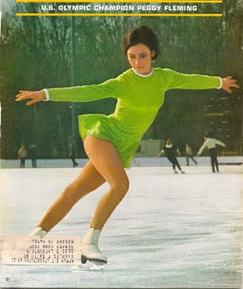 The Olympics are coming! My first remembered Olympics were Innsbruck in 1968 when Peggy Fleming charmed the world with her skating and that hunk Jean Claude Killy walked off with all the skiing medals. While cleaning out the attic last summer, I came upon a folder of clippings, including some from Paris Match. (Subscribing to the magazine was a requirement of my high school French class.) Most went in the recycling, even those pictures of Killy. But a couple of Peggy in her chartreuse dress went on the inside of my supply cupboard door along with the one of Todd Eldredge and me the day he visited Special Olympics in Indy. I’m not a sports fanatic (just ask my family!) so why do I like the Olympics so much?
One reason is that it’s not football. Don’t get me wrong. I don’t dislike football, but the season goes on forever. For two weeks during the Olympics there are a whole variety of things going on that you don’t see every Sunday afternoon and every Monday night and all day Thanksgiving and New Years—things like downhill and slalom, luge and bobsled, short track, hockey and figure skating. Each event is the peak of quality. The outcome of each is critical. The second thing I love about the Olympics is the stories. A male friend once complained, “Why do they waste so much TV time on all that background stuff? Just show me the competition!” But it is the background stuff that I love. Each athlete is the main character in his or her own story, a story full of obstacles to overcome, a story whose happy (or unhappy) ending is about to be played out before the cameras. Admittedly, a psychologist friend of mine calls the Olympics “a celebration of out-of-balance lives.” Another friend, whose teen-age daughter just missed the Olympic cut a few years ago, threatened to make her a T-shirt that said, “I can’t; I have to practice.” But those stories inspire me to strive harder in all I do to be the best I can be—which includes my writing, my work with children, my walk with the Lord. But I think the biggest reason why I love the Olympics is that for two weeks we imagine what it would be like if all the world’s conflicts took place on athletic fields, mountain slopes and ice rinks instead of battle fields. In ancient Greece a truce was proclaimed during the Olympic games. Wars were suspended, legal disputes and the death penalty were forbidden. Unfortunately we can’t count on that in 2010. The Vancouver security budget is $900-million! But for two weeks the headlines will be about gold medals and new records. That doesn’t mean suffering in Haiti will end, the Greek economy will suddenly stabilize or Iran will promise not to use its new nuclear capability. 1968 was an era of student upheaval and assassinations. But for two weeks we imagine how the world could be.
1 Comment
LeAnne
1/7/2015 01:40:29 am
This post was moved from a previous site. All comments were lost.
Reply
Leave a Reply. |
AuthorLeAnne Hardy has lived in six countries on four continents. Her books come out of her cross-cultural experiences and her passion to use story to convey spiritual truths in a form that will permeate lives. Add http://www.leannehardy.net/1/feed to your RSS feed.
To receive an e-mail when I post a new blog, please subscribe.
Categories
All
Archives
November 2022
|
 RSS Feed
RSS Feed